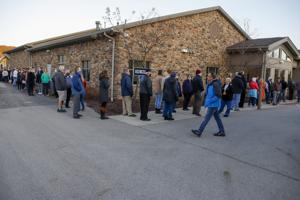Ballot questions dominate final days of primary election campaign season in Pennsylvania

(The Center Square) – On Tuesday, voters across Pennsylvania will head to the polls for another primary election, but the campaign season’s most contested race features no particular candidates, at all.
Instead, it’s two proposed constitutional amendments that, if approved by voters, would require legislative support to extend disaster declarations beyond 21 days.
Gov. Tom Wolf’s administration says the “knee-jerk” policy would undermine the state’s response during emergency situations and jeopardize federal aid awarded during ongoing disasters.
“Despite the COVID-19 pandemic being the first example of a disaster declaration being used in regard to an infectious disease outbreak, many have come to view emergency response through that lens,” said Pennsylvania Emergency Management Agency Director Randy Padfield during a visit to Chester County on Friday. “Drastically changing a process that has worked exceptionally well for all other disasters that we’ve experienced in the past … is extremely short-sighted.”
The comments came during one of the administration’s handful of campaign stops across the state to discuss the implications of changing the constitution to limit the governor’s emergency powers.
This, after Pennsylvania’s COVID-19 disaster declaration nears its 15th month. Wolf has renewed the 90-day status four times since the pandemic hit on March 6, 2020, and said it has allowed him to waive regulations and licensing requirements on health care workers, activate National Guard troops to emerging outbreak centers and vaccination sites, and secure $293 million in federal reimbursement for residents through the Public Assistance disaster program.
Adding statutory requirements into the process and shortening declarations to just three weeks could cause gaps in state response that leave residents without support, Padfield said.
Besides, he said, the legislative process often “moves too slowly” to address emergencies.
“The citizens of Pennsylvania deserve something better than a knee-jerk reaction that will only serve to adversely impact the state’s ability to respond to emergency situations in a timely and efficient manner,” he said.
Legislative Republicans bristle at the implication that the amendments function as retribution for a tense year between their caucuses and the administration.
House Majority Kerry Benninghoff, R-Bellefonte, in an editorial published by City & State Pennsylvania, said this isn’t about “the settling of sour grapes over a few vetoes.”
“Nothing can be further from the truth,” he said. “The handling of this pandemic by this administration has been a case study in how our current emergency authority laws can be exercised by any Pennsylvania governor to completely shred the rule of law and our legal norms.”
The most high-profile example of the extent of the governor’s emergency powers came when Wolf enacted sweeping economic and travel restrictions at the onset of the pandemic.
Republicans tried – through vetoed legislation and multiple lawsuits – to roll back mandates and reopen businesses in less-impacted regions of the state, to no avail.
They argued that the one-size-fits-all approach crushed small businesses, spiked unemployment and ruined lives. Wolf said his policies prioritized public safety as health experts developed a deeper understanding of the virus and how it spreads.
But other complications arose from the administration’s unilateral policymaking, lawmakers insist. In a news conference last week, Benninghoff said the state awarded a $23 million contract to Insight Global for contact tracing services using the state’s emergency declaration to bypass typical bidding protocols.
“That means that the Wolf administration did not need to seek other bids, did not have seek better security maintenance, and did not have additional scrutiny over the issuance of this contract,” he said.
The company and the Department of Health now face a class-action lawsuit after more than 72,000 residents discovered their personal information was stored in unsecured Google spreadsheets, accessible on the internet through the click of a link.
“What these amendments would ultimately do is reinsert the General Assembly – the voice of the people – into these discussions,” said Jason Gottesman, spokesperson for the House Republican Caucus, last week. “Over the course of the last 14 months, Pennsylvanians have been harmed after repeated instances of gross mismanagement by the Wolf administration, which has been allowed to perpetuate unchecked by the unilateral executive authority vested in the governor as a result of self-declared emergency disaster declarations.”
Padfield said governors have enacted more than 60 disaster declarations since 1996, with a little more than a third requiring amendments to add counties or extend the emergency beyond 90 days.
The statewide emergency for the opioid crisis, for example, has been ongoing since 2016. Padfield said there’s no reason to challenge the process now, after decades of successful use.
“By prematurely terminating a disaster declaration, the commonwealth signals to the federal government that the emergency or disaster, no matter what the cause, is under state control, meaning the federal government could end the disaster period,” he said. “This could impact future federal funding for any ongoing response or recovery operations, which can total in the millions of dollars, and the state would ultimately bear those costs.”
Disclaimer: This content is distributed by The Center Square
